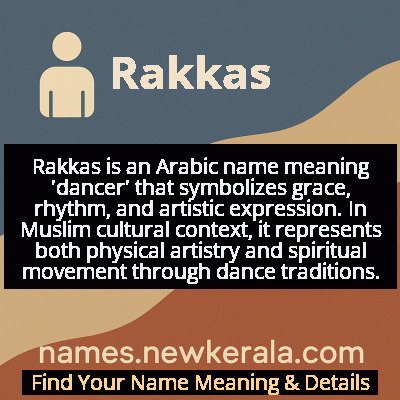Rakkas Name Meaning & Details
Origin, Popularity, Numerology Analysis & Name Meaning of Rakkas
Discover the origin, meaning, and cultural significance of the name RAKKAS. Delve into its historical roots and explore the lasting impact it has had on communities and traditions.
Name
Rakkas
Gender
Male
Origin
Muslim
Lucky Number
7
Meaning of the Name - Rakkas
Rakkas is an Arabic name meaning 'dancer' that symbolizes grace, rhythm, and artistic expression. In Muslim cultural context, it represents both physical artistry and spiritual movement through dance traditions.
Rakkas - Complete Numerology Analysis
Your Numerology Number
Based on Pythagorean Numerology System
Ruling Planet
Neptune (Ketu)
Positive Nature
Intuitive, analytical, spiritual, and inquisitive.
Negative Traits
Secretive, reserved, aloof, and can be overly critical.
Lucky Colours
Green, yellow.
Lucky Days
Monday.
Lucky Stones
Cat’s eye, moonstone.
Harmony Numbers
1, 5, 6.
Best Suited Professions
Scientists, researchers, spiritual leaders, detectives.
What People Like About You
Depth of knowledge, analytical skills, spirituality.
Famous People Named Rakkas
Rakkas al-Masri
Traditional Dancer and Choreographer
Revived and preserved traditional Sufi whirling dances across the Middle East
Rakkas Öztürk
Cultural Ambassador
Founded the Anatolian Dance Preservation Society and performed internationally
Rakkas Hassan
Dance Instructor
Established one of the largest traditional dance schools in Istanbul
Rakkas al-Farsi
Musician and Performer
Integrated traditional dance with modern music forms
Name Variations & International Equivalents
Click on blue names to explore their detailed meanings. Gray names with will be available soon.
Cultural & Historical Significance
Throughout history, dancers (rakkas) have played important roles in cultural celebrations, religious ceremonies, and social gatherings across the Muslim world, from Morocco to Indonesia. The name reflects the Islamic appreciation for artistic expression that uplifts the spirit and celebrates creation. In Ottoman courts, skilled dancers were highly respected, and the tradition continues in modern times through various folk dance forms that preserve cultural heritage while adapting to contemporary artistic expressions.
Extended Personality Analysis
Individuals named Rakkas are typically characterized by their expressive nature, artistic sensibility, and physical grace. They often possess a natural rhythm and coordination that makes them excellent at any activity requiring movement and timing. These individuals tend to be emotionally expressive and have a strong connection to their physical being, using movement as a form of communication and self-expression. Their creative energy often makes them charismatic and engaging personalities who can captivate others with their presence.
Rakkas-named individuals usually have a deep appreciation for beauty in all forms and may excel in various artistic pursuits beyond dance, including music, visual arts, or poetry. They are often social beings who enjoy bringing people together through shared experiences of joy and celebration. Their emotional intelligence tends to be high, allowing them to connect deeply with others and understand unspoken feelings and moods. This combination of artistic talent and social grace makes them natural performers and communicators in both personal and professional settings.
Modern Usage & Popularity
In contemporary times, Rakkas remains a distinctive name choice within Muslim communities, particularly among families with artistic backgrounds or those wishing to honor cultural dance traditions. While not among the most common names, it has maintained steady usage in countries like Turkey, Egypt, and parts of the Middle East where traditional dance forms are celebrated. The name has seen a slight resurgence in recent years as younger generations seek to reconnect with cultural heritage and unique, meaningful names. It's particularly popular among families involved in performing arts or those who value creative expression, serving as both a nod to tradition and a celebration of artistic identity in modern Muslim societies.
Symbolic & Spiritual Meanings
Symbolically, Rakkas represents the harmony between body and spirit, the rhythm of life, and the expression of joy through movement. The name embodies the concept of dance as a metaphor for life's journey - with its ups and downs, rhythms and pauses, all coming together in a beautiful expression. It symbolizes the idea that life itself is a dance, requiring balance, timing, and grace to navigate successfully. The dancer represents the human soul moving in harmony with universal rhythms, finding beauty in motion and expression in physical form, while also serving as a reminder of the temporary nature of all things as each movement gives way to the next in the continuous flow of existence.

